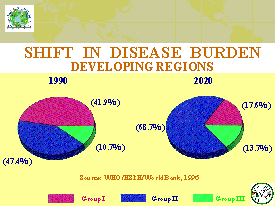 A
SYMPOSIUM- Caring for Children: A Global Perspective
A
SYMPOSIUM- Caring for Children: A Global PerspectiveThe Georgetown University's Child Development Center (GTUCDC) in partnership with and with partial support from CECHE hosted a symposium--Caring for Children: A Global Perspective on Thursday, May 17, 2001 at the Marriott Marquis Hotel in New York City.
CECHE Vice Chairman, Ambassador Mark Palmer was the keynote speaker. He emphasized global concerns about the prospects of children in the twenty first century, stating that "The world in terms of children with special needs is particularly divided between those who have the right to fight openly for them, to organize for these children, to attack governments, to demand more, and those who do not have these rights". He proposed that "in the childhood of children now being born, that over the next 25 years, we must help open up these societies, we must help these children and their parents gain control over their own lives". Ambassador Palmer further stated that "Globalization is an immense good for children; opening of societies will bring universal progress in all realms. We have the chance for unprecedented achievement over the next 25, 50 and 100 years". He concluded that "Overall, the central challenge is in fact to raise expectations, to believe it is possible to create a world without dictators and a world in which all children are protected, educated, healthy and can achieve their full potential".
After this introduction, the panel addressed the following topics:
- Childhood: A Cultural Perspective;
- Health and Educational Challenges for the 21st Century; and
- Community Successes in Caring for Children.
As a member of the panel on Health and Educational Challenges for the 21st Century, CECHE Chairman Dr. Sushma Palmer shared her perspective on Global Health in Transition. She pointed out that while remarkable progress in the 20th century revolutionized the health conditions of most of humanity, WHO estimates that over a billion people, especially women and children in developing countries, entered the 21st century without sharing in these gains. More than ten million children in the developing world, she stated, die each year before reaching the age of five, mostly from diseases that can be prevented or cured. She remarked that a new paradigm in global health in the new millennium presents the opportunity to ensure that children not only survive but also realize their full potential for good health, and that achieving this goal should be among the highest priorities in the first decade of the 21st century.
Dr. Palmer summarized the elements of the new paradigm, or epidemiological transition of the 1900s that resulted in a major shift in leading causes of premature death and disability around the globe: from Group I diseases-infections and malnutrition -to Group II diseases-heart disease, cancer, diabetes mellitus, obesity or other non-communicable or lifestyle-related diseases. She pointed out that in India, China and Sub Saharan Africa, for adults under the age of 70, the probability of dying from heart disease is already greater than for their western peers.

A Shift in Disease Burden
In fact, the benefits of prosperity in developing countries can be easily outweighed, she stated, by the health risks of a poor lifestyle - over-nutrition, physical inactivity heavy alcohol and tobacco consumption-- that historically accompany economic growth. Furthermore, non-communicable conditions such as heart disease, cancer and obesity are no longer simply problems of adulthood. Obesity among middle class adults and children, even in India and Latin America, for example, is a growing burden-as is diabetes mellitus-both conditions mediated by changing diets and a sedentary lifestyle. Furthermore, WHO predicts that worldwide, more than 200 million children alive today will die from tobacco-related disease, unless current smoking trends are reversed.
Developing countries thus confront a double jeopardy: epidemics of non-communicable diseases, and for the poorest in these countries, a continuing burden of infectious diseases and undernutrition and consequently excess infant mortality. And for those infants that do survive malnutrition and infection are predisposed to reduced stature, diabetes mellitus, and a host of respiratory, musculoskeletal, and cardiovascular conditions in adulthood.
In summary, health policy-makers in this millennium face a dual challenge: halting the global epidemics of non-communicable diseases, especially in developing countries, and simultaneously in developing countries addressing the unfinished agenda of combating certain infectious diseases that survived the 20th century.
Dr. Palmer proposed the following Global Health Agenda for this decade:
- Greatly reduce the burden of excess mortality and morbidity suffered by the poor, especially mothers and children, largely by prevention through good hygiene and good nutrition or treated through immunization with cost effective, easily available vaccines.
- Develop more effective health systems to cope with present and future challenges. This means diversifying the service sector to select the best and most cost effective interventions and assessing the impact of the interventions.
- Invest in expanding the global research and knowledge base that made the 20th century health revolution possible, with special emphasis on research needed for control of drug-resistant microbial strains such as for tuberculosis, malaria, and pneumonia, which overwhelmingly affect the poor.
- Provide global leadership and advocacy, especially for global or regional health problems such as for HIV/AIDS and malaria, where concerted action is crucial. However, the solutions to national health problems lie overwhelmingly within countries.
Experience in high-income countries tells us, Dr. Palmer concluded that "prevention of tobacco addiction alone could reduce the global disease burden by nearly 40%. And, low-saturated fat, plant-based diets and other changes in lifestyle could cut disease risks by an additional 30%, through public health measures, and especially through individuals taking charge of reducing their own health risks".

Scenes from the
Communities Can Project
For further information contact Dr. Phyllis Magrab at 202-687-8837.
Questions? Comments? Concerns? E-mail CECHE at CECHE@comcast.net
 Go
back to the CECHE home page
Go
back to the CECHE home page
